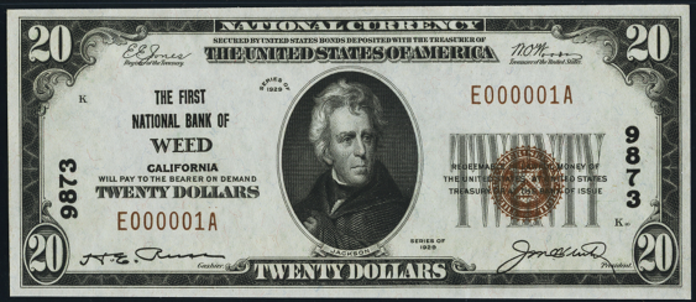Twenty Dollar Notes › Nationals › 1929 Twenty Dollar National Bank Notes › Illinois Charters › 1929 $20 La Grange Illinois First National Bank
Get Value Now
| Item | Info |
|---|---|
| Series | 1929 |
| Charter | #12653 First National Bank of La Grange, Illinois |
| Year Chartered | 1925, 251 Banks Chartered |
| City Info | La Grange, a suburb of Chicago, is a village in Cook County, in the U.S. state of Illinois. The population was 15,550 at the 2010 census. The area around La Grange was first settled in the 1830s, when Chicago residents moved out to the west due to the rapid population increase in the city in the decade since its incorporation. The first settler, Robert Leitch, came to the area in 1830, seven years before the City of Chicago was incorporated. La Grange's location, at approximately 13 miles from the Chicago Loop, is not considered far from the city by today's standards, but in that time the residents enjoyed the peace of rural life without much communication with urban residents. Source: Wikipedia |
| Similar Cities | If your note doesn't match try: 1. La Grange, Missouri - First National Bank 2. La Grange, Georgia - First National Bank 3. La Grange, Texas - First National Bank 4. La Grange, Indiana - National Bank of La Grange 5. La Grange, Georgia - La Grange National Bank 6. La Grange, North Carolina - National Bank of La Grange 7. La Grange, Illinois - La Grange National Bank |
| Seal Varieties | Small Brown |
| See Also | If your note doesn't match try: 1. 1929 $20 Federal Reserve Bank Note 2. 1928 $20 Federal Reserve Note 3. 1928A $20 Federal Reserve Note 4. 1928B $20 Federal Reserve Note 5. 1928C $20 Federal Reserve Note 6. 1934 $20 Federal Reserve Note |
| Other Info | 1. Value depends on notes known for charter, condition and market demand. |
| Neat Fact | Full and partial sheets of National Bank Notes are known to exists. Families of bank officials, particularly those who signed the notes, kept them as keepsakes. Some sheets are extremely valuable. Others are more common. |
No Obligations Offers and Appraisals
Please submit a good photo or scan. It will be identified and evaluated. Understand there may be subtle differences between the image you see above and your note. Signatures, design, markings and note condition will determine the offer price. Notes in Uncirculated or better condition receive the best offers.
Appraisals can be estimated for wholesale and retail prices. Wholesale is what dealers typically pay. Retail is what a collector might pay. Retail is slightly higher in most cases.
Please visit this page for USA Paper Money Reference. Do not treat this page as a reference guide, it is for appraisal and acquisition purposes only.
